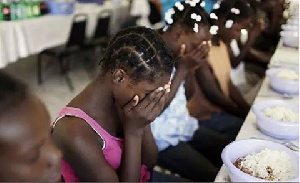The United Kingdom is partnering with the Government of Ghana to protect the most vulnerable and marginalised through the “Leave No One Behind” social protection programme.
Mr Thomas Hartley, the Deputy British High Commissioner to Ghana said the programme would be supported with £39.2m of UK funding over the next five years.
He said a key component of the programme supports a centralised channel for beneficiaries of all social protection programmes to raise grievances and report violations and other abuses, report malpractices, and request information on all social protection programmes.
Mr Hartley this had been operationalised through the creation of a call centre, ‘the Helpline of Hope” situated at the Ministry of Gender Children and Social Protection.
He said this on Friday at a Stakeholders’ Conference in commemoration of the World Day Against Human Trafficking – “Blue Day” in Accra. The event was organised by the Ministry of Gender, Children and Social Protection, in collaboration with civil society, with funding from the British High Commission.
It was to give stakeholders the opportunity to find out how far they had come in the fight against human trafficking in Ghana.
The United Nations defines human trafficking as the recruitment, transportation, transfer, harbouring, or receipt of persons by improper means (such as force, abduction, fraud, or coercion) for an improper purpose including forced labour or sexual exploitation.
Each year, the UN observes the World Day Against Trafficking in Persons, to raise awareness, encourage vigilance and gain support for the prevention of human trafficking.
Mr Hartley said modern-day slavery was one of the biggest human rights challenges of our time; stating that “It attacks the most vulnerable, strips them of their freedom and often their humanity, and commits them to a life that, for some victims, is a fate worse than death”.
“It is our responsibility as citizens of this earth to ensure it ends, and ends for good.”
He recalled that in September 2017, in the margins of the UN General Assembly in New York, many nations including Ghana joined the UK Prime Minister’s Call to Action to End Forced Labour, Modern Slavery and Human Trafficking (MSHT).
He said this was a clear statement of political will by the UK and an intent to work domestically, regionally, and internationally to achieve SDG 8.7 – and to take immediate and effective measures to eradicate forced labour, and end modern slavery and human trafficking.
He said so far over 60 countries had endorsed the UK’s Call to Action (including Ghana, United States, Australia, Japan and Italy).
He said the UK was a long-standing partner to the Government of Ghana and was committed to accelerating Ghana’s move towards self-reliance, in line President Nana Addo Dankwa Akufo-Addo’s ‘Ghana Beyond Aid’ Agenda.
“We have a deep partnership across security, prosperity, and inclusion, including our strong people to people links.”
Mr Harley said: “For this partnership to flourish, together we agree that all of the UK’s and Ghana’s citizens must benefit from economic growth. We must make it inclusive, and shaped to address poverty and protect the most vulnerable and marginalised groups. Today, we recognise an important aspect of this shared goal: tackling human trafficking.”
He said almost every country had national human trafficking laws, yet people continue to be trafficked – the majority of them, women and girls.
“We welcome the progress made by Ghana in tackling modern slavery, through implementing the Human Trafficking and Children’s Acts (banning employment of children), the National Action Plan and creating an Anti-Human Trafficking Unit within the police to investigate cases and refer individuals for prosecution,” he stated.
The Deputy High Commissioner said the UK’s National Child Trafficking Advice Centre (CTAC UK) had been working with stakeholders to raise standards of safeguarding and child protection in Ghana.
He said this programme was delivered in partnership with some local anti-child trafficking partners (Afrikids, GIS, GP, DSW).
Madam Freda Prempeh, a Deputy Minister of Gender, Children and Social Protection, said in 2018, through the courts, the Anti-Human Trafficking Units of the Ghana Police and Immigration Services had 20 convictions for offences of human trafficking and 12 for other related offences.
She said there was significant improvement in 2018 in terms of prosecution unlike in 2017 when they had only four convictions.
Source: Ghananewsagency.org
 Home Of Ghana News Ghana News, Entertainment And More
Home Of Ghana News Ghana News, Entertainment And More




